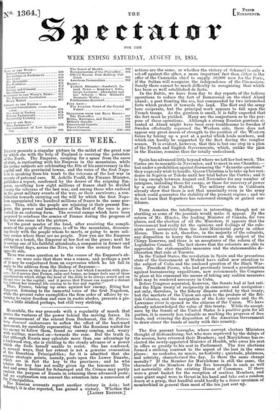ifeanwhile, the war proceeds with a regularity of march that
Proves the vastness of the power behind the moving forces. In an announcement of the retreat from Bucharest, the St. Peters: burg .Tournal endeavours to soften the effect of the backward movement, by carefully representing that the Russians waited for the enemy to follow them, found no enemy coming, and, weary With waiting, marched on—towards the rear. But the truth is, that although Russia may calculate more than one advantage by a backward step, she is yielding to the steady advance of a power .which she finds herself unable to resist. She has confessed, in several ways, that her retreat is not a genuine evacuation at the Danubian Principalities ; for it is admitted that she re tains strategic points, namely, posts upon the Lower Danube, which are in fact the key to the provinces; and he who etains the key has not really given up the tenement. The nfte t and army destined for Sebastopol and the Crimea may partly bzuptlain the purpose of Russia in retaining these advanced posts ; th2,1(! explanation can convert the retention into a concession of e Principalities. o The Russian accounts report another victory in Asia ; but aehamyl, it is also reported, has gained a victory. Whether the
actions are the same, or whether the victory of Schamyl is only a set-off against the other, a more important fact than either is the offer of the Caucasian chief to supply 50,000 men for the Porte, if the Sultan will recognize the independence of the Circassians. Surely there cannot be much difficulty in recognizing that which has been so well established de facto.
In the Baltic, we have from day to day reports of the tedious operations to reduce the fort of Bomarsund on the chief Aland island ; a post fronting the sea, but commanded by two intrenched forts which protect it towards the land. The fleet and the army here cooperate, but the principal work appears to fall upon the French troops. As the garrison is small, it is fully expected that the fort must be yielded. Many are the conjectures as to the pur- pose of these operations. Although a strong Russian garrison si- tuated at Aland might have been very troublesome to Sweden if Sweden effectually espoused the Western side, there does not appear any great access of strength to the position of the Western forces by taking up a post at a portal which leads nowhere, and which can hardly be supported by the fleet during the rougher season. It is evident, however, that this is but one step in a plan of the French and English Governments, which, unlike the pitin in the Euxine, remains thus far totally undisclosed.


























